Blog Post
Posted by Dion Todd January 15th, 2023 2,137 Views 2 Comments
Bible Study: The Gospel of John, Chapter 2 from Refreshing Hope Ministries on Vimeo.
Today, we are going to study John chapter 2 in depth. You can follow along in your own Bible if you like. I will be reading from the World English Bible because it is the only modern English translation that is copyright-free. I can read the entire Bible on video and upload it to the Internet without any legal drama or breaking anyone's rules. After you finish this study, please take the accompanying quiz to test your knowledge. Thanks to everyone that has participated so far. Let's get started:
First, let's set our location and do a brief catchup. In John chapter 1, Jesus was baptized by John the Baptist, and the Holy Spirit descended on Him. After John said, "Behold the Lamb of God," two of John's disciples followed Jesus and spent the afternoon with Him. Then Andrew, Peter, Philip, and Nathanael traveled to Galilee with Jesus. That is where we begin our story today:
John Chapter 2, beginning in verse 1, reading from the World English Bible: The third day, there was a wedding in Cana of Galilee. Jesus' mother was there. 2 Jesus also was invited, with his disciples, to the wedding.
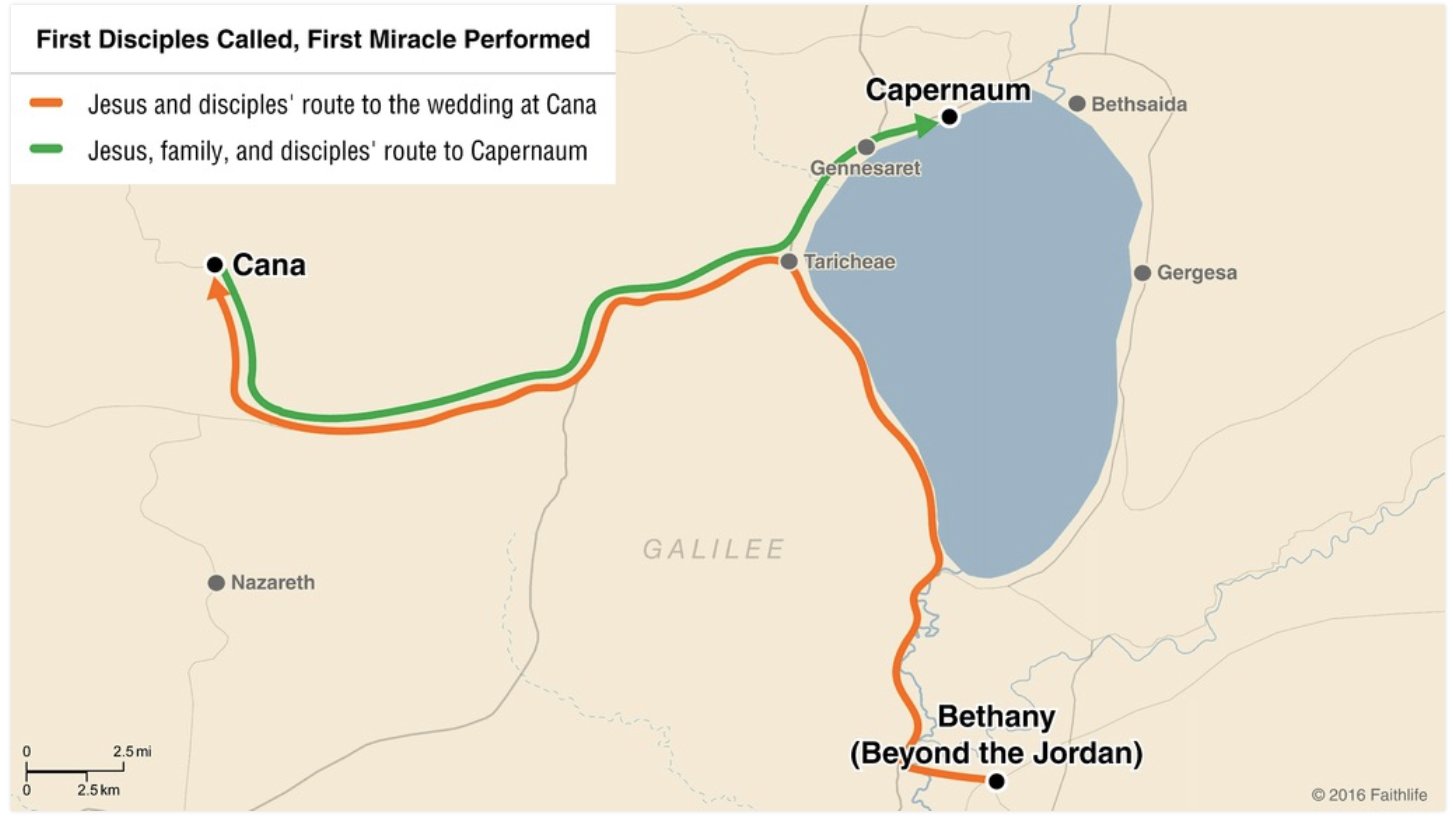
The wedding would usually take place in the late evening following a feast. The bride and groom were led home in a torchlight parade with a canopy held over their heads. They took the longest route possible so everyone could wish them well on the way. Instead of going away on a honeymoon, the newlyweds had an open house for a week. People came to visit them and brought them food and gifts. The wedding was a week-long event with new people visiting each day.
During this time, Israel had been conquered and occupied by the Roman empire. The people living there were poor, broken, and overtaxed. A wedding celebration like this was considered the supreme occasion. Many would go through the rest of their lives without having another celebration like it.
3 When the wine ran out, Jesus' mother said to him, "They have no wine."
During a Jewish wedding feast, wine is essential. Not so people could get drunk, but because wine symbolized joy, exhilaration, and celebration. It was the bridegroom's responsibility to provide refreshments for the guests, and there could even be a lawsuit if the wine was not provided. A considerable amount of food and wine would be consumed over the week-long event.
Perhaps because of a lack of resources or for some other reason, they didn't have enough wine at this particular wedding. The childhood dreams of their perfect wedding celebration were about to become a nightmare. Not having enough wine at the wedding feast was a big deal.
The wine shortage was an embarrassing situation for the bridegroom, who was responsible, so Mary spoke to Jesus about it. Mary and her Son Jesus were obviously very close, and her request shows that she had faith in Him being able to change their situation.
4 Jesus said to her, "Woman, what does that have to do with you and me? My hour has not yet come."
When Jesus addressed Mary as "woman," it wasn't meant to be disrespectful or unloving, even though it sounds distant or abrupt today. Jesus used this word to address Mary Magdalene (John 20:15), the Samaritan woman at the well (John 4:21), and His mother at the foot of the cross (John 19:26).
"Why do you involve me?" may mean there were relatives there who were closer, and it was their responsibility to help first.
Note: John refers to the hour of Jesus seven times (John 2:4; 7:30; 8:20; 12:23, 27; 13:1; 17:1). It was the hour of His death when He would complete His work on the cross.
5 His mother said to the servants, "Whatever he says to you, do it." 6 Now there were six water pots of stone set there after the Jews' way of purifying, containing (20 to 30 gallons each) two or three metretes apiece.
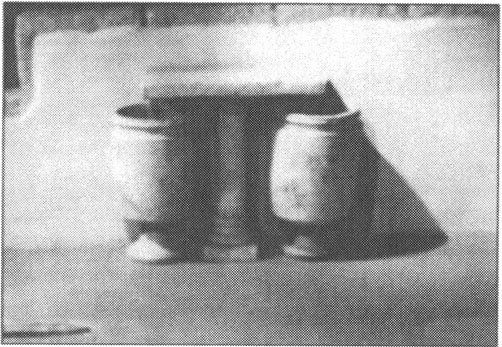
7 Jesus said to them, "Fill the water pots with water." So they filled them up to the brim. 8 He said to them, "Now draw some out, and take it to the ruler of the feast." So they took it.
The jars were not completely full, so Jesus had the servants top them off. Then they drew some out and took it to the master of the banquet. They did so in faith, risking serious embarrassment if they handed the master a cup of wash water!
9 When the ruler of the feast tasted the water now become wine, and didn't know where it came from (but the servants who had drawn the water knew), the ruler of the feast called the bridegroom 10 and said to him, "Everyone serves the good wine first, and when the guests have drunk freely, then that which is worse. You have kept the good wine until now!"
The custom of the day was to bring out the very best wine first and then, after the guests had become dulled, to bring out a wine of lower quality. Yet, the wine Jesus made from the water was the best they had ever tasted. The master of the banquet was astonished at the quality of the wine.
John doesn't tell us when the actual miracle occurred, whether during the filling or the pouring. Also, the servants didn't actually do the miracle. Yet, because of their obedience, they took part in it.
John 1:17 tells us that "the law was given through Moses, but grace and truth came through Jesus Christ." Moses turned water into blood in Exodus 7:17, signifying that the law brings death. While the first recorded miracle of Jesus is turning water into wine, bringing gladness and joy. This miracle transformation at the wedding also happened on the third day (John 2:1), and we know that Jesus Christ rose from the dead on the third day after His crucifixion.
A note about the wine: Some go to great lengths to convince others that the wine Jesus made here, and all the wine in the New Testament, was actually unfermented grape juice. I feel that is misleading and error, though I once passionately believed it myself. Being I was taught a lie, I now feel pretty strongly about correcting it.
I am not promoting alcohol use, for there are plenty of reasons to avoid it, both within and without the Bible. What I want to address is the practice of people teaching their personal preferences as biblical sin. Let's call it "man-made sin," where you force your beliefs on others and then try to make the Bible support it. That is what prohibition did in the United States in the 1920s.
Here is a simple truth about unfermented grape juice in the Bible that you can test for yourself at home. When exposed to air, grape juice becomes wine in twenty-one days or less. That is its natural progression.
I learned this first at Church while preparing Communion with "Welch's 100% Grape Juice." We had Communion once a month, so I used part of a jug and put it back in the refrigerator. The following month when I went to reuse it, it had already become wine. I had to use a fresh bottle each month to prevent this.
In light of that, grapes ripen and are usually picked by the end of September in the fall, while Passover occurs about eight months later in April during the spring.

To look deeper, the word John used here is "Oinos." Strong's Greek #3885 (Oinos) "Wine, the naturally fermented juice of grapes."
Paul used the same word in Ephesians 5:18 when he cautioned us to "not be drunk with wine (Oinos) but be filled with the Spirit." Paul told Timothy: (1 Timothy 5:23 NKJV), “No longer drink only water, but use a little wine (Oinos) for your stomach’s sake and your frequent infirmities.” The same Greek word (Oinos) is used in all three verses. Why make it say anything else?
Summary: The wine Jesus made would have been fermented, but the alcohol content would probably be lower than the wine we have today. Yet, you could certainly get drunk off of it if you had too much. Scripture tells us, “Don’t be drunk with wine.” The “Don’t drink wine nor touch it” was a belief that came much later. It is perfectly fine to abstain from alcohol, and if you have any at all it should be in moderation. Yet, don't try to make Scripture support your personal preference. Let's avoid adding our manmade sins to His word.
Mark 7:6 WEB "They worship me in vain, teaching as doctrines the commandments of men."
Jesus's provision of wine at the wedding in Cana was extravagant. Far above and beyond their needs, and extremely high quality. It was more than enough. This was a pattern for Him. It happened when there were twelve baskets of leftover bread after He multiplied the five barley loaves (John 6:13). And when the disciples caught so many fish, their nets began breaking, and their boats began sinking (Luke 5:7). God can take care of you. Ephesians 3:20 tells us that God is able to do far more abundantly, beyond all that we ask or think. He is more than enough.
11 This beginning of his signs Jesus did in Cana of Galilee, and revealed his glory; and his disciples believed in him. 12 After this, he went down to Capernaum, he, and his mother, his brothers, and his disciples; and they stayed there a few days.
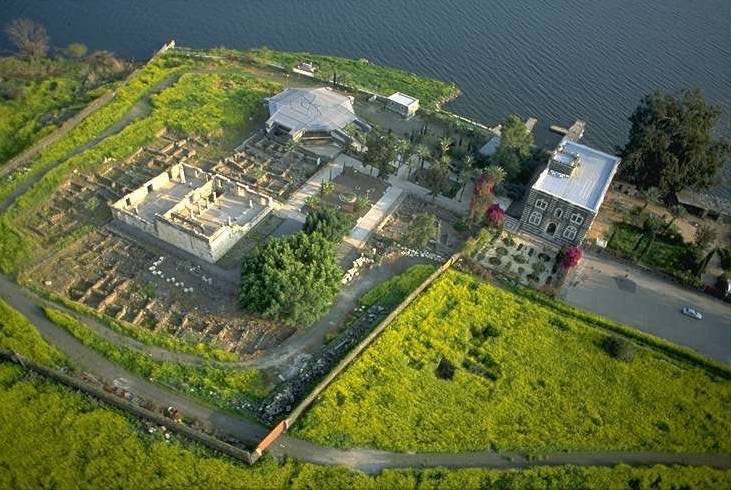
13 The Passover of the Jews was at hand, and Jesus went up to Jerusalem.

14 He found in the temple those who sold oxen, sheep, and doves, and the changers of money sitting.
As Jesus made His way through the crowded streets of Jerusalem, they would have been lined with people selling trinkets and souvenirs. Yet, when He got to the temple, it was far worse inside. Jesus saw what was happening there in the outer courts. This was the court of the Gentiles and the only place in the temple where Gentiles could pray.
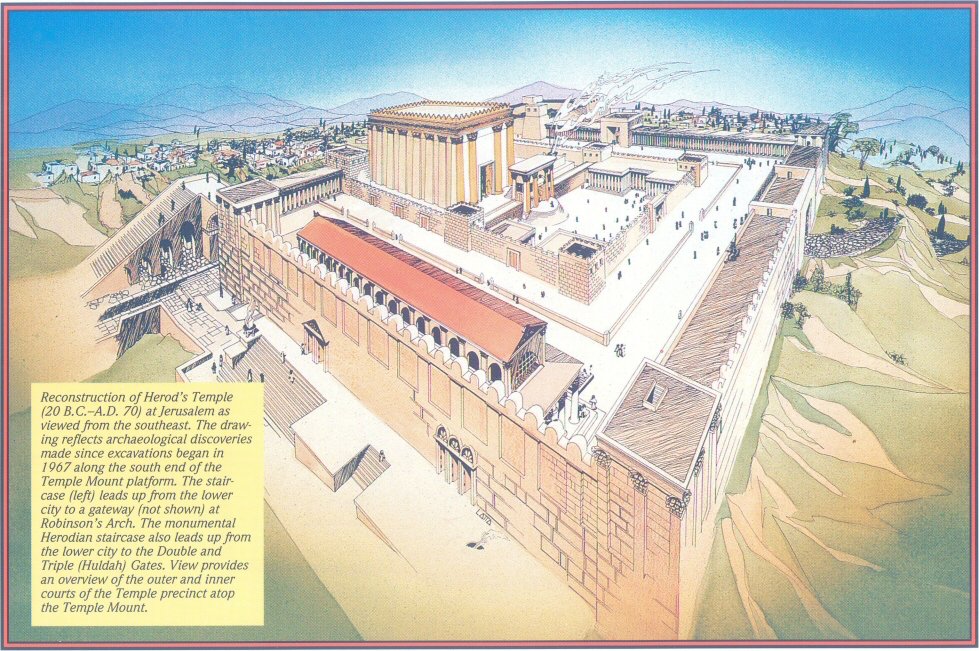
Another racket that was going on there was "approved animals" for offerings. If you brought your own, then an inspector could judge it as "unclean" and then conveniently sell you an acceptable one. Extortion was common inside the temple grounds, and the high priest Annas was behind the whole thing. The high priest actually sold franchises for the money-changing booths and the animal sales. What Jesus found in the temple must have looked like a religious circus, complete with sheep, oxen, birds, and people haggling over the weight of a coin.
15 He made a whip of cords and drove all out of the temple, both the sheep and the oxen; and he poured out the changers' money and overthrew their tables. 16 To those who sold the doves, he said, "Take these things out of here! Don't make my Father's house a marketplace!" 17 His disciples remembered that it was written, "Zeal for your house will eat me up."
Jesus crafted a whip out of cords and then proceeded to "cleanse" the temple. Politely asking them to leave wouldn't work. There is no need to sugar-coat this, for the gentle Lamb became a Lion. This wasn't Church as usual. There was money and livestock scattered everywhere, and their tables were overturned. The people in the courtyard had to have been shocked. Apparently, they fled the area quickly, with Jesus helping those who were not already moving by swinging a cat-of-nine-tails. The disciples who were so impressed with the temple must have watched Him with a dropped jaw.
Today there is an image of a gentle Jesus who is a weak, good-natured fellow whose only goal in life is to let us off the hook and hold nothing we do against us. Yet, that isn't the Christ spoken of in the Scriptures. This is merely an idol that has been created over the years. Don't get me wrong, Jesus is loving, forgiving, and accepting, but He isn't blind or stupid. Your actions will have eternal consequences unless you repent.
Jesus told us (John 14:15 WEB), "If you love me, keep my commandments." The Apostle John wrote: (1 John 2:4 NASB) The one who says, "I have come to know Him," and does not keep His commandments, is a liar, and the truth is not in him."
In Mark 3:5, there was a man with a withered hand in the synagogue, and the Pharisees watched Jesus closely to see if He would heal the man on the Sabbath day. Jesus looked at them in "anger."
Another time when He was dealing with the Pharisees, He told them this: (Matthew 23:33 NASB) "You serpents, you brood of vipers, how will you escape the sentence of hell?" Jesus is loving and kind, but let us never mistake that for weakness. He is anything but weak.
We should note that Jesus' first miracle at the wedding in Cana was converting water into wine. His next action in John was cleansing the temple. That is always the case with us. First, we are converted, then He sets about cleaning us up. He will accept us just as we are, but He loves us too much to leave us like that.
The other three gospels mention Jesus cleansing the temple near the end of His ministry, while John includes it at the start. Perhaps it happened twice, or they didn't list it in chronological order. They all agree that it happened at least once.
Jesus felt holy anger because of the disrespect the Jews were showing in the house of God. They had turned the worship of God into a thriving business, and this was their biggest sale of the year. They said all the right words but did all the wrong things. Jesus rightly called them hypocrites, merely actors playing a part in a religious drama (Matthew 23:23).
18 The Jews therefore answered him, "What sign do you show us, seeing that you do these things?" 19 Jesus answered them, "Destroy this temple, and in three days I will raise it up." 20 The Jews therefore said, "It took forty-six years to build this temple! Will you raise it up in three days?" 21 But he spoke of the temple of his body. 22 When therefore he was raised from the dead, his disciples remembered that he said this, and they believed the Scripture and the word which Jesus had said.
The Jews were so outraged that Jesus would interrupt their work during the busy season. After all, many of them had purchased the right to conduct business in the courtyard from the high priest Annas.
The Jews asked Jesus for a sign that He had this authority, which led to a discussion about the temple. Perhaps Jesus pointed at Himself and said, "Destroy this temple, and in three days, I will raise it up." For He was speaking about His body. Which we know the Jews would later kill and put in a tomb. Yet, after three days, Jesus would get up and walk out.
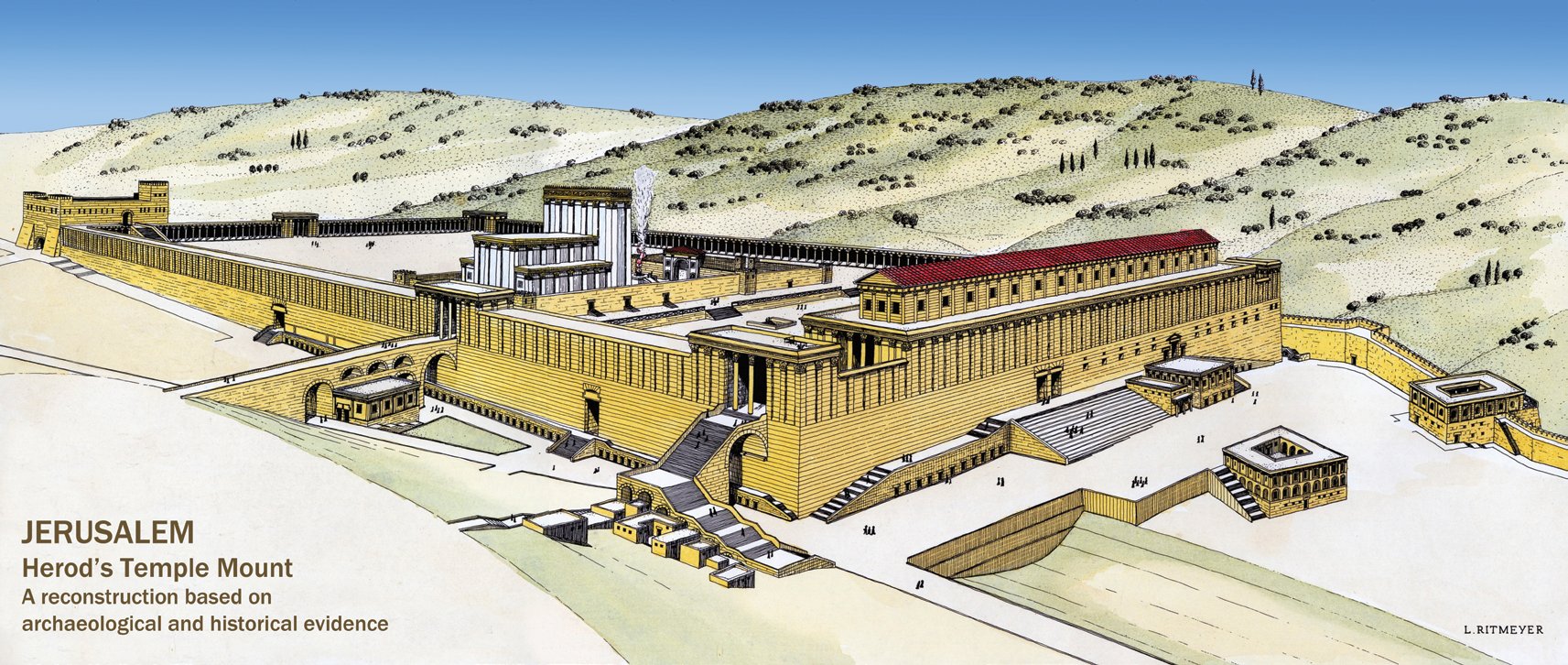
23 Now when he was in Jerusalem at the Passover, during the feast, many believed in his name, observing his signs which he did. 24 But Jesus didn't entrust himself to them, because he knew everyone, 25 and because he didn't need for anyone to testify concerning man; for he himself knew what was in man.
The Lord indeed loves us, yet, He knows what is in our hearts. These people saw miracles, signs, and wonders, and they were fascinated. Yet, their belief was shallow.
(Mark 4:16–17 NASB) “In a similar way these are the ones on whom seed was sown on the rocky places, who, when they hear the word, immediately receive it with joy; and they have no firm root in themselves, but are only temporary; then, when affliction or persecution arises because of the word, immediately they fall away.
Later, when Jesus was standing before Pilate, many of these same people were shouting, "Crucify Him!" (Luke 23:21).
This concludes today’s chapter of our ongoing Bible Study. Thank you for participating and being a part of Refreshing Hope! To complete this study, we invite you to test your knowledge with the accompanying quiz!

This blog post has an accompanying Bible quiz: John Chapter 2

